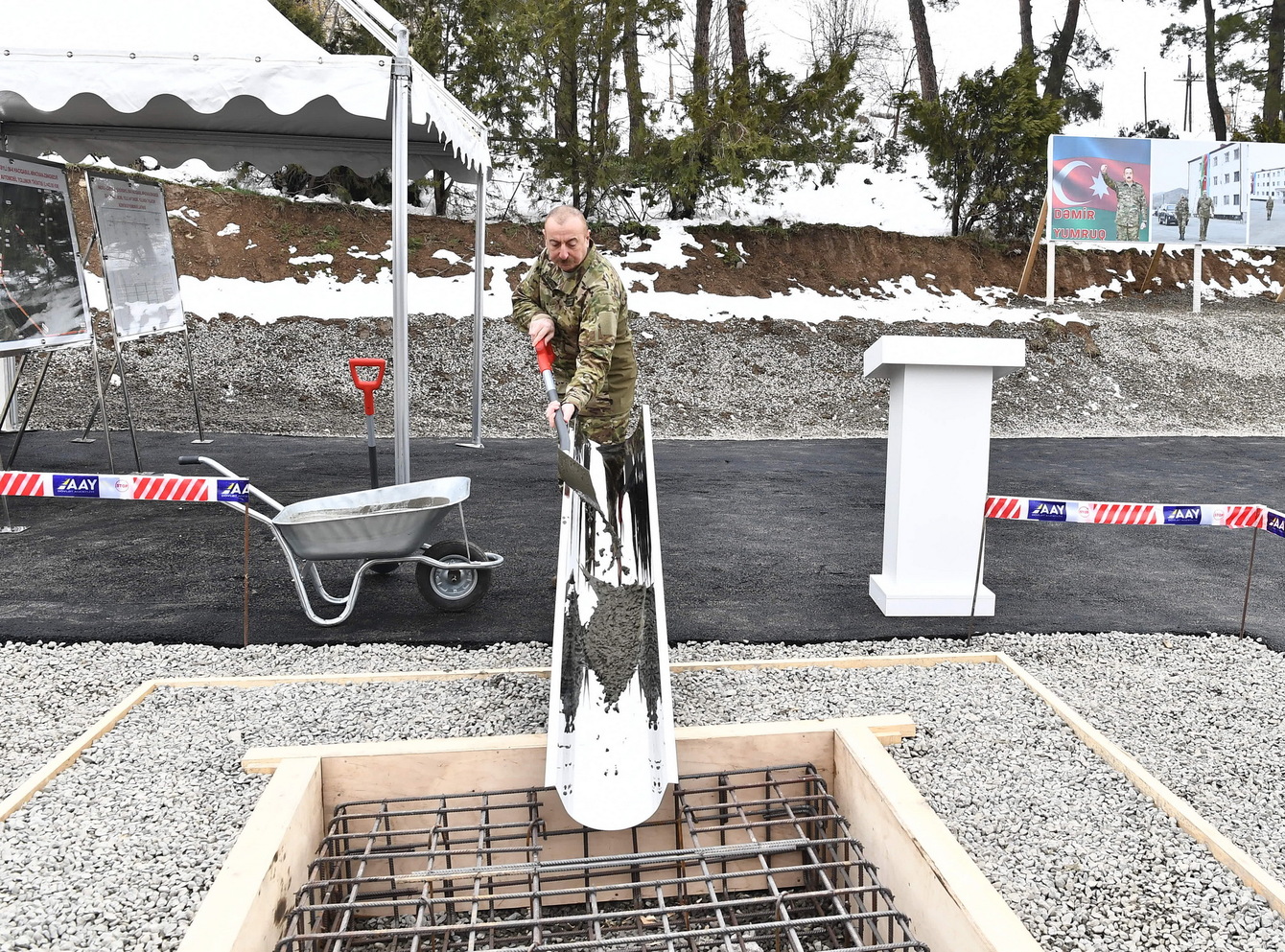Azerbaijan’s President Ilham Aliyev laid the groundwork for two new highways in the liberated Karabakh region during his visit to the districts of Fuzuli and Khojavend on Monday.
The first road, dubbed Fuzuli-Hadrut, measures 13 kilometers in length and consists of four lanes. The highway will reportedly facilitate travel to the largest Hadrut settlement in the Khojavend district. The Azerbaijani army retook control over Hadrut after 28 years of the Armenian illegal occupation on October 9 last year.
“The construction of this road is of great importance for the restoration of the liberated areas,” President Aliyev said. “It is not the first project. Several road projects are already underway. The restoration of liberated lands has begun. The road from Fuzuli to Shusha is under construction – the Victory road is being built. At the same time, the construction of the Barda-Aghdam road will be completed soon. Another road will be built from Horadiz to Zangilan.”
President Aliyev broke ground for the Hadrut-Jabrayil-Shukurbayli highway in the Hadrut settlement. The four-lane road spans 43 kilometers in length and facilitates uninterrupted connection between Hadrut and the district of Jabrayil. In the Shukurbayli village, the road connects with another highway that leads to the Minjivan settlement of Zangilan and the Zangezur corridor, a multi modal transport route that will open a direct connection between Azerbaijan’s mainland and its southwestern exclave of Nakhchivan.
The latest outbreak of war in the region started on September 27 last year after Armenia’s forces deployed in the occupied Azerbaijani lands shelled military positions and civilian settlements of Azerbaijan. The attacks triggered the Azerbaijani forces to take immediate counter-offensive measures for pushing back the assault. The war ended in a tripartite ceasefire statement signed on November 10 by Armenia, Azerbaijan, and Russia. By this time, Azerbaijani forces liberated more than 300 settlements, including the cities of Jabrayil, Fuzuli, Zangilan, Gubadli, and Shusha, from nearly 30-year-long illegal Armenian occupation. Armenia also returned the occupied Aghdam, Kalbajar, and Lachin districts to Azerbaijan by December 1 as part of the obligations it took under the ceasefire deal.
Shortly after the liberation of territories, the government of Azerbaijan rolled out large-scale construction and restoration projects in various fields, including transport connections. Construction of the first major Fuzuli-Shusha highway, dubbed “the Victory Road,” kicked off in November. The 100-kilometer-long highway facilitates travels to Shusha, the central city in the Karabakh region, the liberation of which was crucial in the retreat of Armenia’s occupying forces.
In February, Azerbaijani authorities revealed plans for the construction of the next road in the Karabakh region. Azerbaijan’s leading highway construction company, the State Agency of Azerbaijan Automobile Roads (SAAAR) teamed up with Turkish Proyapi Company to build a road to Kalbajar, a mountainous district in the north of the Karabakh region. The new road to Kalbajar starts from the Goygol district and cuts through the Omar mountain pass at an altitude of 3,261 meters above sea level on the Murovdagh mountain range.
In addition to highway projects, a new airport is expected to come online in the district of Fuzuli by the end of this year. The Vice President of Azerbaijan Airlines (AZAL) Etibar Huseynov said the runway of the Fuzuli International Airport will be put into operation by the end of 2021, while the airport will be fully ready for operation sometime in April-May in 2022.







 Armenian sappers commenced on Monday mine-clearance operations in the territories adjacent to the Saint Mary Church in village of Voskepar (Armenia...
Armenian sappers commenced on Monday mine-clearance operations in the territories adjacent to the Saint Mary Church in village of Voskepar (Armenia...
 Iran and Pakistan have signed eight cooperation documents in various fields, and agreed to strengthen ties to fight terrorism in the region.
Iran and Pakistan have signed eight cooperation documents in various fields, and agreed to strengthen ties to fight terrorism in the region.
 President Aliyev emphasized the critical role of the North-South Transport Corridor in fostering transport cooperation between Azerbaijan and Russi...
President Aliyev emphasized the critical role of the North-South Transport Corridor in fostering transport cooperation between Azerbaijan and Russi...



